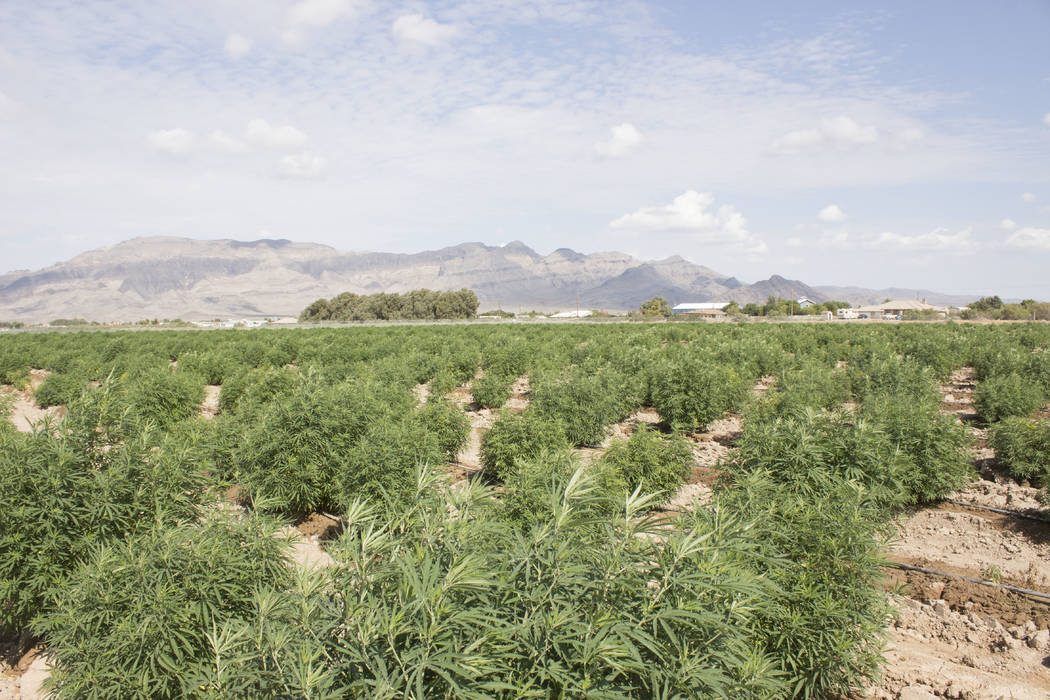
The level of Nevada’s industrial hemp production could be set to increase in the coming years.
The U.S. Congress passed the final draft of the 2018 Farm Bill in December that includes legalizing the cultivation of industrial hemp across the U.S., sending it to President Donald Trump’s desk. The bill’s passage, along with the president signing the legislation into law, could bring an increase in hemp production to an already growing industry in the state.
Russell Wilhelm, industrial hemp program manager for the Nevada Department of Agriculture, reported in mid-September that there were 110 registered growers producing hemp on approximately 2,000 acres, along with 150,000 square feet of hemp being grown indoors, across Nevada.
This was well ahead of the 2016 growing season when there were 13 registered growers growing across 250 acres in the state, according to Wilhelm.
If the 2018 Farm Bill is signed into law, state agencies and the U.S. Department of Agriculture would regulate industrial hemp. The bill’s enactment would also remove industrial hemp from the federal government’s controlled substances list and remove barriers the industry has faced, including access to banking and crop insurance.
Along with the legalization of industrial hemp, the rollout would also take some time.
Tim Gordon, president of the Colorado Hemp Industries Association, said it could take one to two years for federal officials to create regulations for industrial hemp in a Sept. 26, 2018 report in Stateline, a nonprofit news service of Pew Center.
“Just because the farm bill passes doesn’t mean hemp is suddenly legal and everything’s great,” Gordon said in the report.
Congress on industrial hemp
The growth of industrial hemp, which has little THC (tetrahydrocannabinol), the psychoactive compound that gives marijuana users a high, in 2016, was fostered by efforts in Congress and the Nevada state House. Industrial hemp, which goes through a testing process by state’s department of agriculture, has to contain less than 0.3 percent of THC or it must be destroyed.
The 2014 farm bill that was passed by Congress and signed into law by then-President Barack Obama, made way for states to allow for the growing of hemp for research purposes through universities or a state’s department of agriculture.
Under the guise of Congress’ efforts, Nevada legislators passed Senate Bill 305 during the 2015 legislative session, which gave the go-ahead to the Nevada Department of Agriculture to implement a research-based program.
That law went into effect on Jan. 1, 2016.
Nye County hemp farms
Since the first growing season, under the state’s department of agriculture program, Pahrump and Nye County have also experienced an increase in the number of industrial hemp growers and grow area.
As of the time of an inquiry to the state’s department of agriculture in mid-September, Pahrump had 16 growers working on 84 acres of outdoor grow area and across 40,0776 square feet of indoor farming space.
In the overall Nye County area, in the same time frame, the state’s agriculture department reported having 45 registered growers that were working across 865 acres of outdoor area and on 70,000 square feet of indoor space.
According to a report in the Aug. 11, 2017 edition of the Pahrump Valley Times, Pahrump had an approved four acres of industrial hemp growing space in 2016. At the county level, there were 59 approved acres for industrial hemp growth in 2016.
If industrial hemp is legalized, Nevada and other areas across the U.S. could see an increase in farming and in other products and services related to the industry.
“I’m very optimistic that once the interstate commerce flows, it’s just going to take off,” said Michel Whalen, founder and president of the Nevada Hemp Association.
Whalen anticipates that there will be over 100 growers in Nye County for 2019. He launched the Nevada Hemp Association in 2015 after the state’s Legislature passed legislation to put a hemp program in place.
Whalen not only sees growth potential in the CBD (cannabidiol) oil market but also edibles, topicals and other related products, which are produced from hemp. Cannabidiol is nonpsychoactive, or won’t cause a high.
CBD oil is often used for medicinal reasons: as an anticonvulsant, antioxidant and an anti-inflammatory, just to name a few.
Whalen also sees a potential for other products to be made from hemp.
“Not just in the growing aspect, but in the production of so many different types of products,” he said. “Right now, the focus is on CBD because there’s no infrastructure for the plastics or the paper or the hemp batteries, etc. Nevada’s looking for anybody, entrepreneurs especially, to enter the paper and plastics and the other industries that are going to dwarf recreational.”
Should hemp become legalized, Whalen also foresees investment from large corporations in the state that currently are being deterred by hemp being illegal at the federal level.
Contact reporter Jeffrey Meehan at jmeehan@pvtimes.com. On Twitter: @pvtimes